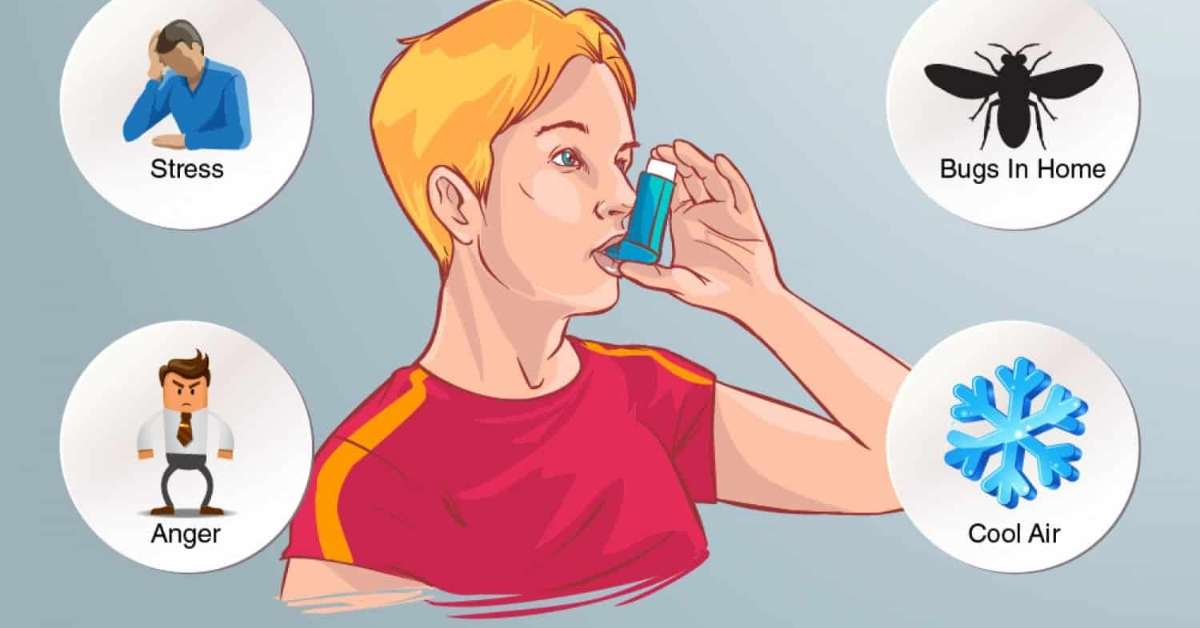While asthma cannot be cured, it can be effectively managed through medication and lifestyle modifications. One crucial aspect of asthma management is identifying and avoiding triggers that can exacerbate symptoms. By taking control of environmental factors, individuals with asthma can reduce the frequency and severity of asthma attacks. Let’s explore how to identify and avoid asthma triggers to improve respiratory health.
Also Read: Breaking Down Diabetes Myths: Insights from Diabetes Doctor in Patiala
Understanding Asthma Triggers
Asthma triggers are substances or environmental factors that can irritate the airways and trigger asthma symptoms. These triggers can vary from person to person, and identifying individual triggers is essential for effective asthma management. Common asthma triggers include allergens such as pollen, dust mites, pet dander, mold, and cockroach droppings. Other triggers may include respiratory infections, air pollution, tobacco smoke, strong odors or fumes, cold air, exercise, and stress. By understanding potential asthma triggers, individuals can take proactive steps to minimize exposure and prevent asthma attacks.
Identifying Asthma Triggers
Identifying asthma triggers requires careful observation and monitoring of symptoms. Keeping a detailed asthma diary can help track symptoms, activities, and environmental factors that may trigger asthma attacks. Pay attention to patterns and correlations between symptom onset and exposure to potential triggers. Additionally, allergy testing can help identify specific allergens that may be triggering asthma symptoms. By working closely with a healthcare provider, individuals can pinpoint their asthma triggers and develop personalized strategies for avoidance and management.
What are the avoidable triggers of asthma?
Many asthma triggers are found within the home environment, making it essential to create a clean and allergen-free living space. Take proactive measures to reduce exposure to common allergens by regularly cleaning and vacuuming carpets, upholstery, and bedding to remove dust mites and pet dander. Use allergen-proof mattress and pillow covers to minimize exposure while sleeping. Keep indoor humidity levels between 30% and 50% to prevent mold growth, and use air purifiers with HEPA filters to remove airborne allergens. Avoid smoking indoors and eliminate sources of indoor air pollution such as scented candles, air fresheners, and harsh cleaning products.
How do you control asthma triggers?
Outdoor asthma triggers such as pollen, air pollution, and cold air can exacerbate symptoms, particularly during certain seasons. Check local pollen counts and air quality forecasts before heading outdoors, and try to stay indoors during peak pollen or pollution times. When outdoors, wear a pollen mask to filter out allergens and cover your nose and mouth with a scarf in cold weather to warm and humidify the air you breathe. Avoid exercising outdoors in cold weather or during high pollen counts, and consider using a rescue inhaler before outdoor activities to prevent exercise-induced asthma symptoms. By taking proactive steps to avoid outdoor triggers, individuals with asthma can enjoy outdoor activities safely and minimize the risk of asthma attacks.
Creating an Asthma Action Plan
Developing an asthma action plan in consultation with a healthcare provider is crucial for effectively managing asthma triggers. An asthma action plan outlines specific steps to take in response to worsening symptoms or exposure to triggers. It includes instructions for using rescue medications, such as inhalers or nebulizers, and guidelines for when to seek medical attention. By following an asthma action plan, individuals can respond promptly to asthma attacks and minimize the risk of severe complications.
Seeking Professional Guidance
For individuals struggling to identify and avoid asthma triggers on their own, seeking guidance from a healthcare professional is paramount. Allergists, pulmonologists, and asthma specialists have the expertise and resources to conduct thorough evaluations, including allergy testing and pulmonary function tests, to pinpoint specific triggers. They can also provide personalized recommendations for managing asthma triggers, such as prescription medications, immunotherapy (allergy shots), and lifestyle modifications. By working collaboratively with healthcare providers, individuals can develop effective strategies for controlling asthma and improving respiratory health.
Educating Family Members and Caregivers
Educating family members, caregivers, and close contacts about asthma triggers and management strategies is essential for creating a supportive and safe environment for individuals with asthma. Ensure that family members are aware of common asthma triggers and know how to recognize and respond to asthma symptoms. Teach them how to use rescue medications and provide instructions for administering emergency treatments if necessary. By fostering understanding and cooperation among family members, individuals with asthma can receive the support they need to manage their condition effectively.
Regular Monitoring and Follow-Up
Regular monitoring and follow-up with healthcare providers are essential components of asthma management. Schedule periodic check-ups with your doctor to assess asthma control, review treatment plans, and adjust medications as needed. Keep track of asthma symptoms, triggers, and medication usage in an asthma diary to identify patterns and trends over time. Be proactive in seeking medical attention if symptoms worsen or if you experience asthma attacks despite adherence to management strategies. By staying vigilant and proactive in managing asthma, individuals can minimize the impact of triggers on their respiratory health and lead fulfilling lives.
Identifying and avoiding asthma triggers is essential for managing asthma and reducing the frequency and severity of asthma attacks. By understanding common asthma triggers and taking proactive measures to minimize exposure, individuals with asthma can take control of their respiratory health and lead active, fulfilling lives. Consult with a healthcare provider for personalized asthma management strategies and guidance on avoiding triggers effectively. With proper management and avoidance of asthma triggers, individuals can enjoy improved respiratory function and quality of life.


